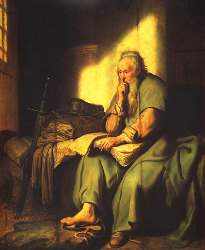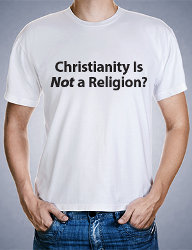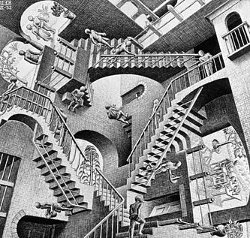3 reasons to stay away from "I went to Heaven" books
Body
“…please hear me say that you don’t need to read the books to make these statements. The very presence of the books is the problem not even necessarily what they contain.”
As iron sharpens iron,
one person sharpens another. (Proverbs 27:17)
“…please hear me say that you don’t need to read the books to make these statements. The very presence of the books is the problem not even necessarily what they contain.”
[amazon 0062065130 thumbnail]
Reprinted with permission from As I See It, which is available free by writing to the editor at [email protected]
President Ronald Wilson Reagan (1911-2004) is known as “the Great Communicator” not merely because he had the polished delivery of an accomplished actor, but because he actually had something substantial to say and often said it very well (“Mr. Gorbachev, tear down this wall!”).
Among the tools of effective communication is the employment of suitable quotes, aphorisms and stories to illustrate or drive home a point or to clarify an idea. Mr. Reagan had a sizeable private stash of quotes and quips and jokes that he had accumulated over the decades, all written out by hand on 4” x 6” cards, ready to be accessed as needed. This stack of cards was kept close at hand in his personal desk drawer for easy reference. At his death, the contents of his desk were boxed up and deposited in the Reagan Presidential Library in California. During some renovations in 2010, this stack of hand-written cards was rediscovered, and a selection of them is herein compiled and published.
The quotes, stories and jokes are divided up into nine sections, viz., “On the Nation,” “On Liberty,” “On War,” “On the People,” “On Religion,” “The World,” “On Character,” “On Political Theater,” and “Humor.” These are followed by a “glossary”—really a brief description of named authors quoted—and a topical index.
Many of the quotations are outstanding—I quote a few of the crème de la crème below (having to leave out many very good ones), but unfortunately, none is documented in the book beyond naming the original author. Reagan’s cards did not provide chapter and page references, but the editor should have, as far as he was able, provided documentation.
 As Bible readers move from Malachi to Matthew, they encounter many new ideas, movements, and institutions never mentioned in the Old Testament. In the Gospels, for example, they read about synagogues, Pharisees, Sadducees, Zealots, and Romans. These words and many others never appeared before in the Old Testament. Readers also may learn that the Old Testament was written in Hebrew, while the New Testament was written in Greek.
As Bible readers move from Malachi to Matthew, they encounter many new ideas, movements, and institutions never mentioned in the Old Testament. In the Gospels, for example, they read about synagogues, Pharisees, Sadducees, Zealots, and Romans. These words and many others never appeared before in the Old Testament. Readers also may learn that the Old Testament was written in Hebrew, while the New Testament was written in Greek.

With all of this as a backdrop (see part 1 in this series), the question is reduced to this: Is God giving authoritative revelation on par with that which He has given in the past, much of which has been inscripturated, or is He not? If He is, then the church of Christ needs to take note and come into compliance with the modern prophecy movement, following its revelations as it would Scripture. But if the Lord is not revealing His inspired word today, then we need to reject the claims of the modern prophets and expose these supposed revelations for what they are. This means the position taken by most on prophecy—cautious but open—is untenable. The cautious but open crowd is skeptical of the claims coming from the prophetic movement and they are suspicious of the many “words from God” that so many evangelicals are claiming. Still they hesitate to embrace cessationism. They are concerned about limiting God or, as it was mentioned above, “putting God in a box.” To this let me make two replies:
 From Voice, Nov/Dec 2012. Used by permission.
From Voice, Nov/Dec 2012. Used by permission.
Despite the fact that the majority of conservative evangelical Christians since the Reformation have held to a cessationist position with regard to divine revelation, true cessationists are rapidly disappearing. In the articles and books I have written nothing has evoked as much criticism and anger as my position that God is speaking to His people today exclusively through Scripture. Due to the influence of a multitude of popular authors, theologians and conference speakers, cessationism is barely treading water, even within the most biblically solid churches and organizations.
As a matter of fact, among those who claim to be evangelicals there are five identifiable views prevalent today on the matter of revelation:
All miraculous gifts exist today, including the gift of prophecy. God speaks through prophets and to His people both audibly (through dreams, visions, words of knowledge), and inwardly (inaudibly in the mind or heart). Representatives of this position are Jack Deere, John Wimber, the Kansas City Prophets, the Assemblies of God and the Word of Faith movement. Charismatic author Tommy Tenney, in his popular book The God Chasers, writes,
God chasers…are not interested in camping out on some dusty truth known to everyone. They are after the fresh presence of the Almighty… A true God chaser is not happy with just past truth; he must have present truth. God chasers don’t want to just study the moldy pages of what God has done; they are anxious to see what God is doing.1
 Reprinted with permission from Baptist Bulletin Nov/Dec 2012. All rights reserved.
Reprinted with permission from Baptist Bulletin Nov/Dec 2012. All rights reserved.
People like me (a 20-something rookie pastor) have probably noticed a trend making its way through social media, bumper-sticker Christianity, and Christian bookstore T-shirt sections. What I’m noticing is not really a new trend or even an original spin on an old idea. It is a mind-set toward Christianity that, as far as I can tell, has influenced every generation since at least the Reformation. The phrase “Christianity is not a religion” is being touted as a fresh way of looking at the relationship of individual disciples of Christ to the practice of Christianity.
Some readers may be familiar with YouTube sensation Jefferson Bathke. Using poetry to express social commentary, Bathke has released a number of videos online that have reached tens of millions of viewers. One of his latest, released in January, “Why I Hate Religion, But Love Jesus,” has garnered over 20 million views. In the opening, Bathke asks, “What if I told you Jesus came to abolish religion?” Admittedly there has been a great deal of response and assessment of this video in the evangelical blogosphere, but most responses do not address the underlying issue prompting such a statement. Is Christianity a religion or not?
This is not a question being raised solely in liberal denominations and emerging groups. This is a sentiment identified on T-shirts and social media of fundamental Bible college students and of individuals in your church and mine, that is, the next generation of Regular Baptists.
The concept of religionless Christianity is pleasing to the “spiritual but not religious” generation of Oprah and The Shack. People, especially young people, love the idea of Christianity without the rigorous restrictions and expectations of their parents’ and grandparents’ Christianity.
We are recently searching for a new home church (sad circumstances) and it has been great getting fed a little on this site. Anyway, I heard that the book from “Stuffed Undies Like” ;) has featured some interviews by church members within certain big Independent Baptist churches and the interviews are anonymous. I was recently accused by some friends from my old church of contributing to this book anonymously?!! While I never did any such thing, I was wondering if anyone else has heard of this?
 From Faith Pulpit, Winter 2012. Used by permission. All rights reserved.
From Faith Pulpit, Winter 2012. Used by permission. All rights reserved.
Qoheleth, the author of Ecclesiastes,1 looked at the various areas of life and concluded that everything was vanity.2 He started (1:2) and ended (12:8) his writing by stating, “vanity of vanities, all is vanity.” Is vanity, however, the theological message of Ecclesiastes? Or should it be understood in a more positive light? Gordon Fee and Douglas Stuart, co-authors of How to Read the Bible for All Its Worth, take differing views: “[one of us] understands Ecclesiastes to be an expression of cynical wisdom, which serves as a kind of ‘foil’ regarding an outlook on life that should be avoided; [the other one of us] understands the book more positively, as an expression of how one should enjoy life under God in a world in which all die in the end.”3 So is Ecclesiastes a warning to us of the vanity of life outside of a relationship with God or a message of how one can enjoy life despite its vanity?
Those who understand Ecclesiastes to be a foil (i.e., a contrast to the rest of the Bible’s teachings) interpret the majority of the book as “a brilliant, artful argument for the way one would look at life—if God did not play a direct, intervening role in life and if there were no life after death.”4 Ecclesiastes 12:13 and 14 is then understood as “a corrective, orthodox warning.”5 “Let us hear the conclusion of the whole matter: Fear God and keep His commandments, for this is the whole duty of man. For God will bring every work into judgment, including every secret thing, whether it is good or whether it is evil.”
Discussion